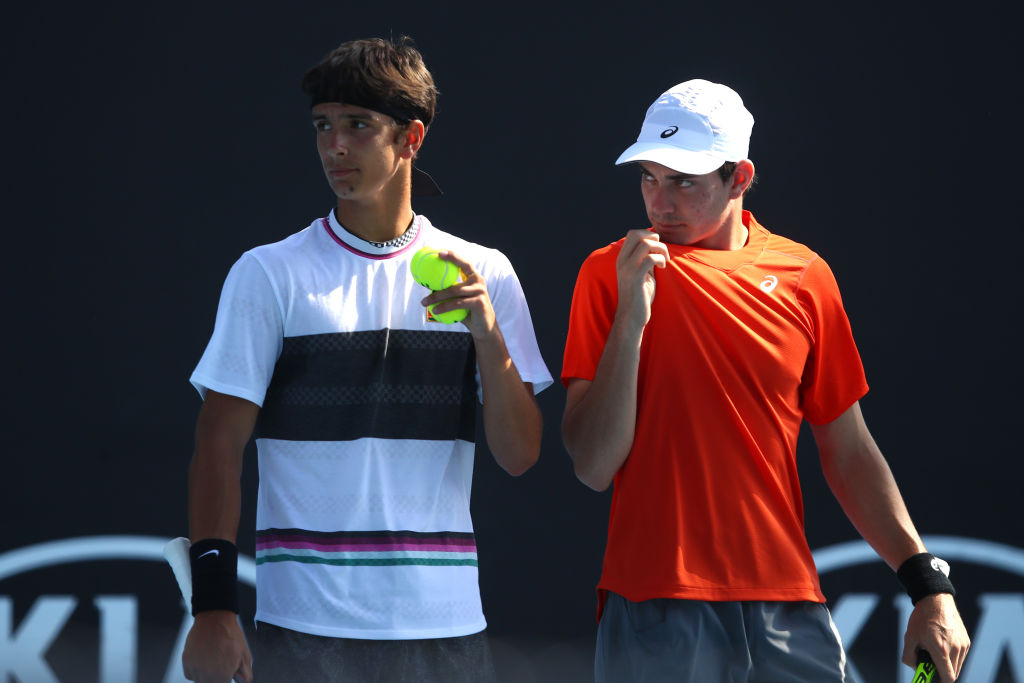Day 12: Talent Spotting
/We are all blind to the future, but the business of talent spotting at a junior Grand Slam is a particularly tricky one. How on earth can you figure out who’s going to ‘make it’? A quick glance at the list of junior Grand Slam winners shines light on the difficulty of the task. For every Roger Federer there’s a Wesley Whitehouse, for every Andy Murray there’s a Vladimir Ignatic, for every Simona Halep there’s a Noppawan Lertcheewakarn.
Part of the problem is that it can be too easy to get sucked in by the fact that all the juniors play such great tennis. They wouldn’t be at a Grand Slam if they didn’t. Matches between juniors really are like very good imitations of professional matches – the players have the same mannerisms and habits, they all crunch serves, they all hit heavy topspin. While there are noticeable drop-offs in physicality, speed, and intensity, the overall feel is similar, and all the players look primed to make the transition.
But reaching the upper echelons of the sport is only partly about forehands and backhands. It’s also got a lot to do with intangible and invisible things, like character, determination, luck, dedication, state of mind, health and hard work.
Thinking about all this, I went to Court 7 today to watch an all-Italian semi-final clash between 16-year-old Lorenzo Musetti and 17-year-old Giulio Zeppieri. The age-gap between the two isn’t reflected in the rankings like you might expect; it’s actually the younger Musetti who is much higher-ranked. He’s the top seed at this year’s Australian Open in fact, having reached the final at the US Open last September.
Musetti certainly had the more eye-catching game. I thought this would be the case after seeing a clip of an outrageous tweener-lob that he hit in the quarter-finals. Today, his more expansive repertoire of shots, more obvious dexterity, and more natural hand skills helped him to a fairly comfortable 6-2, 6-4 victory over Zeppieri. He’s into the final without dropping a set.
Lorenzo Musetti and Giulio Zeppieri
“I think I played my best match of the tournament,” Musetti said afterwards. “It was not easy against Giulio because he’s my friend and doubles partner. But we practise together a lot, and I could take a lot of information from that.”
After promising myself not to get over-excited by anything, there was plenty about Musetti’s style that made it difficult to stay grounded about his future prospects: he consistently nullified Zeppieri’s lefty-serve with a floated slice to the baseline, he ripped a few big forehands, he picked up a fierce return off his toes with a delicious backhand half-volley, he covered the court well and soaked up Zeppieri’s power with ease, he even saved a break point with a gutsy serve-volley.
Lorenzo Musetti
Put it this way, it was easy to see the player on whom Musetti had styled his game. “Roger Federer, of course,” he said with a grin. “I hope to play a bit like him. I have a one-handed backhand, but it’s difficult to compare with Roger. My backhand is a really natural shot for me. It gives my opponents a lot of pain. With dropshots and spin I have a lot of feel.”
Looking beyond Musetti’s fine shot-making for a second, what really struck me was the professionalism that already surrounds him. He had a large entourage, including Patrick Mouratoglou, and he was in-demand with the Italian press after victory. In this respect it felt like he’s already on the path to stardom. Many other juniors will be in the same boat.
So how much can we read into these junior matches? Well, if today is going to be representative of Musetti and Zeppieri’s respective careers, there was a poignant scene at the end. While Musetti looked at ease posing for selfies with fans, Zeppieri simply sat in his chair, head in his hands, crestfallen. In the same way that we can get too caught up in what we see at junior level, I’m sure the players can too.
The reality is that the road ahead is a long one. It ought to be simple - what you do in the juniors should set the tone for your career - but it’s not. The ride gets rough. These Grand Slams are simply a chance for the juniors to walk in the shadows of their heroes, to showcase their talent, to experience the dizzying high of victory and the crushing low of defeat, to learn, to dream. The matches go some way to moulding their careers, but they don’t determine their careers. That comes later.
As for Musetti, he’s obviously got one eye on the future, but he’s focusing harder on the present. “My dream is to become World No.1. But my goal right now is to win this tournament. I hope to post a selfie with the trophy tomorrow.”









